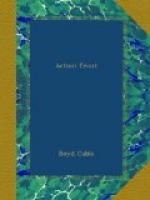At one spot a pool of blood spread wide across the pavement, and still dripping and running sluggishly and thickly into and along the stone gutter, showed where at least one shell had caught more than brick and stone and tree, although now the square was deserted and empty of life.
And even as the two hurriedly skirted the place another shell hurtled over, tripped on the top edge of a roof across the square and exploded with an appalling clatter and burst of noise. The roof vanished in a whirlwind of smoke and dust, and the officers jumped from the doorway where they had flung themselves crouching, and finished their passage of the square at a run.
“Hottish corner,” said one, as they slowed to a walk some distance away.
“Silly fools,” growled the other. “What do they want to hoist that huge Red Cross flag up there for, where any airman can see it? Fairly asking for it, I call it.”
When they came to the outskirts of the town they found rather more signs of life. People were hanging about their doorways and the shops, fewer windows were shuttered, fewer faces peeped from the tiny grated windows of the cellars. And up the center of the road, with lordly calm, marched three Highlanders. The smooth swing of their kilts, their even, unhurried step, the shoulders well back, and the elbows a shade outturned, the bonnets cocked to a precisely same angle on the upheld heads, all bespoke either an amazing ignorance of, or a bland indifference to, the bombardment. Their march was stopped by a sentry, who shouted to them and moved out from the pavement. Some sort of argument was going on as the officers approached, and in passing they heard the finish of it.
“You were pit there tae warn folk,” a Highlander was saying. “Weel, ye’ve dune that, so we’ll awa on oor road. We’re nae fonder o’ shells than y’are yersel. But we’d look bonnie, wouldn’t we, t’ be tellin’ the Cameron lads we promised to meet, that we were feared for a bit shellin’....”
And after they had passed, the officers looked back and saw the three Scots swinging their kilts and swaggering imperturbably on to the town, and their meeting with the “Cameron lads.”
There were no more shells, but that afternoon a Taube paid another of its frequent visits and vigorously bombed the railway station again, driving the inhabitants back once more to the inadequate shelter of their cellars and basements. And yet, as the same two officers marched with their battalion through the town towards the firing-line that evening, they found the streets quite normally bustling and astir, and there seemed to be no lack of light in the shops and houses and about the streets. Here and there as they passed, children stood stiffly to attention and gravely saluted the battalion, young women and old turned to call a cheery “Bonne Chance” to the soldiers, to smile bravely and wave farewells to them.
“Plucky bloomin’ lot, ain’t they, Bill?” said one man, and blew a kiss to three girls waving from a window.




